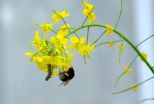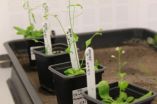(Press-News.org) People seeking help or information online about cutting and other forms of self-injury are likely finding falsehoods and myths, according to new research from the University of Guelph.
Only about 10 per cent of websites providing information about non-suicidal self-injury (NSSI) are endorsed by health or academic institutions, according to a study published recently in JAMA Pediatrics, a journal of the American Medical Association.
It's a troubling finding, says lead author Stephen Lewis, a Guelph psychology professor. "This is a salient public health issue," he said.
People who engage in NSSI – especially adolescents and young adults – often turn to the Internet first when looking for help, support, or resources.
"It's a stigmatizing issue for many people and it's quite misunderstood, so going online is often more appealing to them in terms of getting information," Lewis said.
"Unfortunately, much of the information we found on the Internet is of poor quality, and some of it propagates myths about people who self-injure, which may lead to further stigmatization and isolation."
What people find online may also affect decisions to seek help, he said.
NSSI, which can include cutting, burning and bruising, affects an estimated 14 to 21 per cent of teens and young adults. Teenagers typically self-injure to deal with negative emotions, Lewis said, and the behaviour can lead to physical injuries, scarring and mental health difficulties.
Lewis and Guelph graduate students Jasmine Mahdy, Natalie Michal and Alexis Arbuthnott set out to learn how often people search online for information about NSSI and to assess the quality of available information.
They used a Google keywords program to identify 92 terms related to NSSI that receive least 1,000 hits a month. For each term, they focused on content from the first page of websites displayed in search results.
"We focused on the first page because often people don't get beyond that when doing online searches," Lewis said.
The researchers found that about 22 percent of websites were health information websites. Of these, only one in 10 was endorsed by a health or academic institution.
They also found at least one myth about NSSI on each website, such as linking self-injury to mental health or gender or calling it an attention-seeking act.
Specifically, almost half of websites said people with NSSI have mental illness; about 40 per cent said people who self-injure have a history of abuse; and 37 per cent said mostly women self-injured. All are untrue or overstatements of what is known from research, Lewis said.
The researchers found more than 42 million global searches of NSSI-related terms on the Internet in the past year.
"We were a bit surprised by the number of searches related to the topic but more surprised at how much of the information we came across was of low quality," Lewis said.
Besides exposing people who self-injure to unreliable and inaccurate information, misinformation affects people trying to help, he said.
"Parents, peers and others looking to help someone with NSSI may also be seeking information online, and what they are finding may be impacting their effectiveness as sources of support."
The study recommends getting credible sites onto the top of search pages, improving the quality of online information and educating Internet users on how to make sense of e-health information.
"The Internet potentially is a powerful vehicle to reach out to those who self-injure and offer help and recovery resources," Lewis said. "But we have to do it effectively and correctly."
Last year, he and McGill University professor Nancy Heath launched the Self-Injury Outreach and Support (SiOS) website. It was the first international online initiative offering recovery support and resources for people with NSSI and for friends, families, and school and health professionals.
Lewis also took part in a pioneering 2011 study on teens posting self-injury videos on YouTube and the potential positive and negative effects of this use of social media.
INFORMATION: END
Online self-injury information often inaccurate, study finds
2014-03-31
ELSE PRESS RELEASES FROM THIS DATE:
Tamiflu-resistant influenza: Parsing the genome for the culprits
2014-03-31
Tamiflu is one of the few available treatments for those who come down with the flu. But the virus quickly develops resistance; multiplying at a rate of several generations a day, these tiny pathogens rapidly accumulate genetic mutations. Because of this, they have a good chance of developing counterattacks to the antiviral. How can these infinitesimal variations be identified within the immensity of the virus' genetic code? EPFL researchers have created a computer tool that can shed light on the flu virus' formidable adaptability. They were able to find mutations that ...
Using different scents to attract or repel insects
2014-03-31
Flowering plants attract pollinating insects with scent from their flowers and bright colours. If they have become infested with herbivores like caterpillars, they attract beneficial insects like parasitic wasps with the help of scent signals from their leaves. The wasps then lay their eggs in the caterpillars and kill the parasites. Floral and foliar scents can, however, mutually reduce their attractiveness. That's why flowering plants face a dilemma: should they use their resources to attract pollinating insects and, by extension, for reproduction or should they invest ...
'Cosmic barometer' could reveal violent events in universe's past
2014-03-31
Exploding stars, random impacts involving comets and meteorites, and even near misses between two bodies can create regions of great heat and high pressure.
Researchers from Imperial College London have now developed a method for analysing the pressure experienced by tiny samples of organic material that may have been ejected from dying stars before making a long journey through the cosmos. The researchers have investigated a type of aromatic hydrocarbon called dimethylnaphthalene, which should enable them to identify violent events in the history of the universe.
Samples ...
Hearing loss affects old people's personality
2014-03-31
The researchers studied 400 individuals 80-98 years old over a six-year period. Every two years, the subjects were assessed in terms of physical and mental measures as well as personality aspects such as extraversion, which reflects the inclination to be outgoing, and emotional stability. The results show that even if the emotional stability remained constant over the period, the participants became less outgoing.
Interestingly, the researchers were not able to connect the observed changes to physical and cognitive impairments or to age-related difficulties finding social ...
Mild hypothermia for treatment of diffuse axonal injury: A quantitative DTI analysis
2014-03-31
Mild hypothermia has been shown to exert apparent neuroprotective effects in animal models of diffuse axonal injury. However, the clinical efficacy of mild hypothermia is controversial. Thus, a noninvasive, accurate, and objective technique is urgently required to verify the effect of mild hypothermia in diffuse axonal injury and its prognosis. Fractional anisotropy values in diffusion tensor imaging (DTI) can quantitatively reflect the consistency of nerve fibers after brain damage, where higher values generally indicate less damage to nerve fibers. Therefore, Guojie Jing ...
Emotional children's testimonies are judged as more credible
2014-03-31
In an experimental legal psychology study, two young actors (one girl and one boy) portrayed victims in a mock-police investigation. They were questioned by the police about how they had been harassed by older schoolmates. The police interviews were videotaped in two versions: In one version the children appeared in a neutral manner but in the other version, the children showed clear signs of distress, as they sobbed and hesitated before answering the police officers' questions.
The films were later shown and assessed by law students that were familiar with the Supreme ...
Nano-paper filter removes viruses
2014-03-31
Nanotechnology and Functional Materials, Uppsala University have developed a paper filter, which can remove virus particles with the efficiency matching that of the best industrial virus filters. The paper filter consists of 100 percent high purity cellulose nanofibers, directly derived from nature.
The research was carried out in collaboration with virologists from the Swedish University of Agricultural Sciences/Swedish National Veterinary Institute and is published in the Advanced Healthcare Materials journal.
Virus particles are very peculiar objects- tiny (about ...
CAMH researcher discovers 2 new genes linked to intellectual disability
2014-03-31
(Toronto) March 31, 2014 – Researchers at the Centre for Addiction and Mental Health have discovered two new genes linked to intellectual disability, according to two research studies published concurrently this month in the journals Human Genetics and Human Molecular Genetics.
"Both studies give clues to the different pathways involved in normal neurodevelopment," says CAMH Senior Scientist Dr. John Vincent, who heads the MiND (Molecular Neuropsychiatry and Development) Laboratory in the Campbell Family Mental Health Research Institute at CAMH. "We are building up a ...
NTS's role in the protection of pre-moxibustion on gastric mucosal lesions
2014-03-31
Moxibustion may have protective effects on the stomach mucous membrane against stress gastric ulcer. The potential mechanism of moxibustion may be mediated by transforming growth factor-α, gastric mucosa cell proliferation, inhibition of apoptosis, and the expression of heat shock protein-70. Previous studies have shown that somatic sensation by acupuncture and visceral nociceptive stimulation can converge in the nucleus tractus solitarii (NTS) where neurons integrate signals impacting on the function of organs. To explore the role of the NTS in the protective mechanism ...
New study finds biochar stimulates more plant growth but less plant defense
2014-03-31
In the first study of its kind, research undertaken at the University of Southampton has cast significant doubt over the use of biochar to alleviate climate change.
Biochar is produced when wood is combusted at high temperatures to make bio-oil and has been proposed as a method of geoengineering. When buried in the soil, this carbon rich substance could potentially lock-up carbon and reduced greenhouse gas emissions. The global potential of biochar is considered to be large, with up to 12 percent of emissions reduced by biochar soil application.
Many previous reports ...





